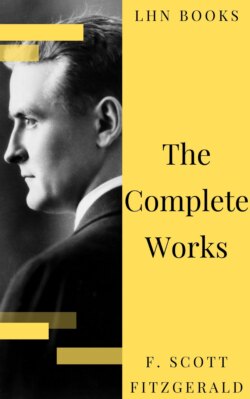Читать книгу The Complete Works of F. Scott Fitzgerald - F. Scott Fitzgerald - Страница 123
На сайте Литреса книга снята с продажи.
V.
Оглавление“Sandra Pepys, Syncopated,” with an introduction by Peter Boyce Wendell, the columnist, appeared serially in Jordan’s Magazine, and came out in book form in March. From its first published instalment it attracted attention far and wide. A trite enough subject—a girl from a small New Jersey town coming to New York to go on the stage—treated simply, with a peculiar vividness of phrasing and a haunting undertone of sadness in the very inadequacy of its vocabulary, it made an irresistible appeal.
Peter Boyce Wendell, who happened at that time to be advocating the enrichment of the American language by the immediate adoption of expressive vernacular words, stood as its sponsor and thundered his indorsement over the placid bromides of the conventional reviewers.
Marcia received three hundred dollars an instalment for the serial publication, which came at an opportune time, for though Horace’s monthly salary at the Hippodrome was now more than Marcia’s had ever been, young Marcia was emitting shrill cries which they interpreted as a demand for country air. So early April found them installed in a bungalow in Westchester County, with a place for a lawn, a place for a garage, and a place for everything, including a sound-proof impregnable study, in which Marcia faithfully promised Mr. Jordan she would shut herself up when her daughter’s demands began to be abated, and compose immortally illiterate literature.
“It’s not half bad,” thought Horace one night as he was on his way from the station to his house. He was considering several prospects that had opened up, a four months’ vaudeville offer in five figures, a chance to go back to Princeton in charge of all gymnasium work. Odd! He had once intended to go back there in charge of all philosophic work, and now he had not even been stirred by the arrival in New York of Anton Laurier, his old idol.
The gravel crunched raucously under his heel. He saw the lights of his sitting-room gleaming and noticed a big car standing in the drive. Probably Mr. Jordan again, come to persuade Marcia to settle down to work.
She had heard the sound of his approach and her form was silhouetted against the lighted door as she came out to meet him.
“There’s some Frenchman here,” she whispered nervously. “I can’t pronounce his name, but he sounds awful deep. You’ll have to jaw with him.”
“What Frenchman?”
“You can’t prove it by me. He drove up an hour ago with Mr. Jordan, and said he wanted to meet Sandra Pepys, and all that sort of thing.”
Two men rose from chairs as they went inside.
“Hello, Tarbox,” said Jordan. “I’ve just been bringing together two celebrities. I’ve brought M’sieur Laurier out with me. M’sieur Laurier, let me present Mr. Tarbox, Mrs. Tarbox’s husband.”
“Not Anton Laurier!” exclaimed Horace.
“But, yes. I must come. I have to come. I have read the book of Madame, and I have been charmed”—he fumbled in his pocket—“ah, I have read of you too. In this newspaper which I read to-day it has your name.”
He finally produced a clipping from a magazine.
“Read it!” he said eagerly. “It has about you too.”
Horace’s eye skipped down the page.
“A distinct contribution to American dialect literature,” it said. “No attempt at literary tone; the book derives its very quality from this fact, as did ‘Huckleberry Finn.’”
Horace’s eyes caught a passage lower down; he became suddenly aghast—read on hurriedly:
“Marcia Tarbox’s connection with the stage is not only as a spectator but as the wife of a performer. She was married last year to Horace Tarbox, who every evening delights the children at the Hippodrome with his wondrous flying-ring performance. It is said that the young couple have dubbed themselves Head and Shoulders, referring doubtless to the fact that Mrs. Tarbox supplies the literary and mental qualities, while the supple and agile shoulders of her husband contribute their share to the family fortunes.
“Mrs. Tarbox seems to merit that much-abused title—‘prodigy.’ Only twenty——”
Horace stopped reading, and with a very odd expression in his eyes gazed intently at Anton Laurier.
“I want to advise you—” he began hoarsely.
“What?”
“About raps. Don’t answer them! Let them alone—have a padded door.”
— ◆ —
